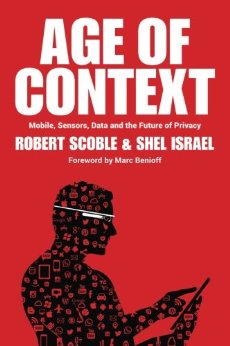 The new book, Age of Context, relates to the messages or information you receive within a precise location. Where you are at any given moment determines the meaning and relevance of the information you consume and the experiences you have.
The new book, Age of Context, relates to the messages or information you receive within a precise location. Where you are at any given moment determines the meaning and relevance of the information you consume and the experiences you have.
When you read Age of Context: Mobile, Sensors, Data and the Future of Privacy, written by veteran tech journalists, Robert Scoble and Shel Israel, be prepared to embrace an entirely new way of viewing the digital world. The future includes glass in homes and skyscrapers that adjusts to mood and weather conditions and lets airplane pilots see through fog—all because the ‘glass understands the context of its environment.’
You’ll read about mobile apps that know your calendar and what’s at the dry cleaners so it can help you pick what to wear. In the not-so-distant future, we will have prosthetic devices sensitive to touch connected to human nerves and operating from brain commands. There will be exoskeletons that empower paraplegics to walk without assistance.
What does this ‘brave new world’ technology have to do with marketers? Technology has unlocked incredible new ways for companies to connect with customers. We have more data and more insight about the customer than ever before, and customers expect companies to use it.
We’re in the midst of a customer revolution where the world is being reshaped by the convergence of social and mobile cloud technologies and businesses need to change to meet the rising expectations of today’s customers.
We are, in fact, moving into an age where context is everything.
What does Age of Context mean for digital marketing? Lee asked this question of co-author Shel Israel, who replied:
“The idea that it is smart marketing when you send out messages that are ignored will be regarded by Contextual Marketers the same way modern doctors regard leeching patients. Instead, something new, called Pinpoint Marketing will emerge, and this will allow responses from prospects of well-over 50%. The remainder may not buy, click, or come into the store, but at least they will not be annoyed by your offer.”
This is a book for smart marketers who will use it as a framework to understand the contextual developments that will be happening over the next few years. Here are a few highlights:
“Your device is your key to all the power of the internet. It is where the superstorm of context thunders into your life.”
The authors discuss the five forces that are changing our experience as a shopper, customer, patient, viewer or online traveler: mobile, social media, data, sensors and location. But mobile is the aggregator of the other four because it’s where they all converge. Despite innovations in next-generation laptops and hand’s free capabilities of wearables, the authors predict the smartphone will be the wireless device of choice for most of the world’s users for at least the next five to 10 years.
“[Glass] is the most immersive technology I have ever experienced. It will change the world… .” Shel Israel
After a couple of hours, Israel realized a remarkable thing: eye contact with whomever he was speaking improved. Google Glass had improved the way people relate with each other. There were no complaints about privacy, only cost. Once younger generations come of age, they’ll have their own discretionary income, say the authors and believe they will embrace hands-free devices enthusiastically. As far as marketing, instead of pay-per-click, revenue will be generated by pay-per-blink! (The authors admit this is conjecture on their part.)
“Contextual technology allows marketers to give more and more customers and prospects right-time experiences.”
From Disneyland and Disney World, who will soon be offering sensors in a throwaway wearable device to personalize kids’ experience to the New England Patriots, who addressed their declining stadium fan base by adopting online and contextual technologies, big brands are embracing the chance to get up close and personal in engaging, creative and revolutionary ways.
“Transparency creates a significant opportunity for every startup that has giant-killing already built into its organizational DNA.”
In the Age of Context, business leadership will need to understand that more is gained than lost by being open and transparent. Ultimately, profitability comes from your customers’ comfort zone. ‘If we are right, then the Age of Context will give us an open new world,’ the authors conclude.
Of course these snippets only scratch the surface of the 230-page book. It’s filled with many, many stories of amazing people and crazy technology. If you’re interested in the convergence of technology, business, consumers and brands, then I highly recommend you buy a copy. I think you’ll be as intrigued by the possibilities technology holds in store for digital marketing as am I.


